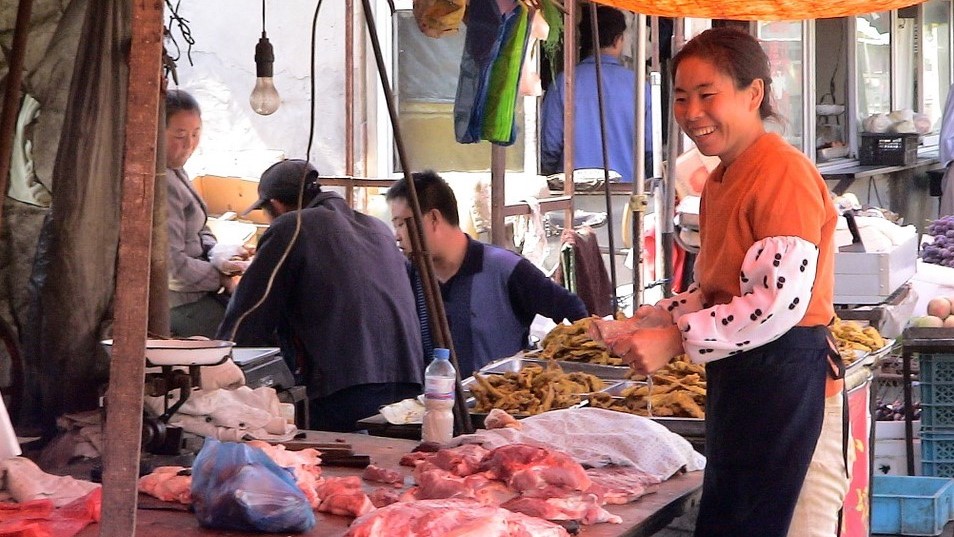

Women promoting agro-product safety along the value chain in rural China
08 November 2021 Charles ARTHUR

Every morning, at half past eight, Lu Yueqiu starts testing food samples at the Jiangpanwan farmers’ market in the county of Quannan in the south-eastern province of Jiangxi. At least 12 samples, including leafy vegetables, meat and aquatic products, are taken for food-safety testing every day. The results are shown on an LED screen in the farmers’ market within an hour.
Business owners who fail the rapid testing are required to immediately stop selling and dispose of the non-compliant products under the supervision of local Administration for Market Regulation.
Sometimes Lu ‘disappears’ from the farmers’ market for a few days. She goes to various communities and towns in the area to conduct an activity called, You sent the food, I will help you test it. Consumers give her edible agro-products and she tests them for pesticide residues and other problems. This activity has received an enthusiastic response from local consumers, strengthening their confidence in the edible agro-products they purchase.
But all this is a recent development. Lu recalls the time, a few years back, when her career started.
“I could not master the basic knowledge of rapid testing, including related rules and regulations, major techniques and the use of toolkits. In addition, the rapid testing in the farmers’ market at that time had just started, with insufficient testing toolkits and simple testing items - mainly for pesticide residues. The test results could merely be judged by the naked eye, which caused difficulties for accurate rapid food-testing.”
Things are better now, thanks to a project implemented by the United Nations Industrial Development Organization (UNIDO). As part of the Improving agro-industrial practice and capacity for poverty alleviation in Quannan project, which began in early 2019, UNIDO has transformed the rapid-testing rooms in Quannan’s farmers' markets and has provided training on how to carry out effective rapid food-testing.


The rapid-testing room at the Jiangpanwan farmers’ market has been equipped with modern rapid testing instruments and reagents (chemicals that indicated the presence of a substance, usually by changing colour).
Lu received training on how to use this, and she says, “I learned a lot during the training process and my professional capacity has significantly improved. Now, I am playing a pivotal role in my team.”
Another part of the UNIDO project provides capacity building to four local agro-businesses and farmers’ cooperatives in Quannan County, so that they can meet the certification requirements of the world’s leading farm assurance programme, Global Good Agricultural Practices (GLOBALG.A.P.). The programme aims to ensuring safe and sustainable food production and sets international standards in the relevant area for the certification of agro-products at a global scale.
Wang Lianying is a technician at a large-scale vegetable production company in Quannan. She participated in the GLOBALG.A.P. training provided under the UNIDO project, and also received training from senior technicians from the China Quality Certification Centre, again in cooperation with UNIDO.
Wang has shared her newly acquired knowledge and skills with her company and with 39 local farmers’ households, helping them to control every critical point of production right from the beginning of the value chain, taking in selection and propagation of seedlings, management, harvesting and the use of agricultural materials - all carried out in strict accordance with norms and standards in order to achieve high-yield and high-quality vegetables.
Currently, the vegetable output of Wang’s company has increased by three, and each grower is now capable of selecting and growing seedlings, and is even more proficient in field management. Wang’s work has led to the creation of more businesses for women in Quannan.
In 2020, with the support of the UNIDO project, the Agro-product Quality and Safety Inspection and Testing Station of Quannan County applied for and was successfully accredited as an Inspection and Testing Agency (CMA) and an Agro-product Quality and Safety Testing Agency (CATL) (a.k.a. "The Dual Certification Programme Programme").
Hu Fuying is the head of Agro-product Quality and Safety Inspection and Testing Station of Quannan County. She smiles when she talks about passing the Dual Certification Programme audit. But only she herself knows how much effort had to be made to overcome all kinds of difficulties and to master the quality and safety quantitative testing technology for agro-products.
Hu says, “The UNIDO project not only provides assistance for the hardware transformation and upgrading of the testing station, but also organizes technical experts in related fields to provide operational guidance.”
Hu seized the opportunity to improve herself by being trained in the operation of liquid chromatographs and other lab equipment, pre-treatment techniques for animal residue samplings, quantitative detection and other detection techniques, as well as the knowledge of scientific and standardized management and maintenance of the testing station.
She says, “As a result, the capacity of all the testing station personnel has been significantly improved. Reports show that, in the first half of 2021, 956 qualitative and quantitative tests for agro-product quality and safety in local agro-bases have been conducted, with a pass rate of at least 99.79%!”